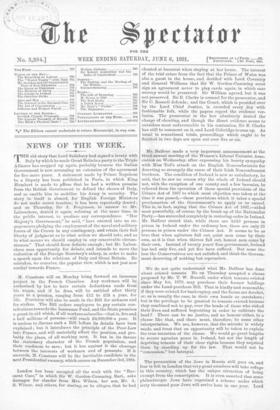London has been occupied all the week with the "Bac-
carat Case," in which Sir W. Gordon-Cumming, Bart., asks damages for slander from Mrs. Wilson, her son, Mr. A. S. Wilson, and others, for stating, as he alleges, that he had
cheated at baccarat when staying at her house. The interest of the trial arises from the fact that the Prince of Wales was also a guest in the house, and decided with Lord Coventry and General Williams that Sir W. Gordon-Ctimming must sign an agreement never to play cards again, in which case secrecy would be preserved. Sir William agreed, but it was not preserved. Sir E. Clarke is counsel for the prosecutor, and Sir C. Russell defends ; and the Court, which is presided over by the Lord Chief Justice, is crowded every day with fashionable folk, while the papers report the evidence ver- batim. The prosecutor in the box absolutely denied the charge of cheating, and though the direct evidence seems to outsiders most unfavourable to his contention, Sir E. Clarke has still to comment on it, and Lord Coleridge to sum up. As usual in sensational trials, proceedings which ought to be finished in two clays are spun out over five or six.






































